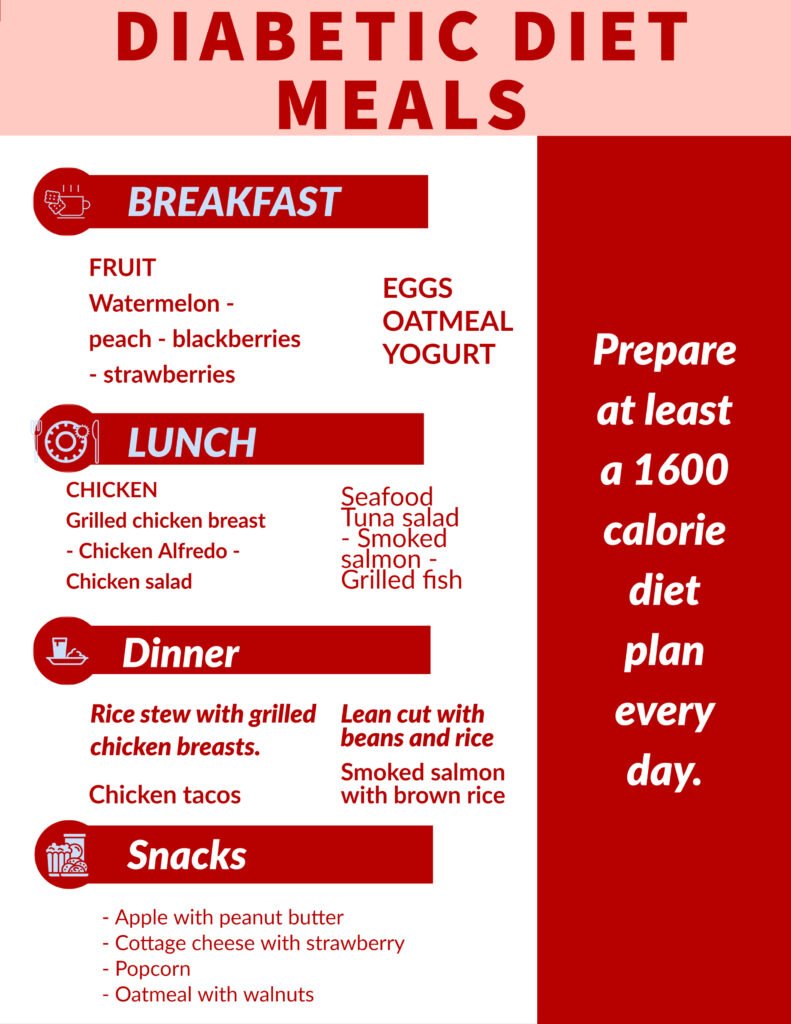Best Diet for Type 2 Diabetes and Weight Loss
Many people suffering from diabetes take a long time to search actively for the Best Diet for Type 2 Diabetes while matching their weight loss goals.
It can be challenging to prepare a whole Diabetic Diet plan that fulfills both goals of controlling your blood sugar plus controlling your weight.
Luckily, the diabetic diet may serve both goals, as you won’t need more than following simple tips to succeed in doing that.
As known, the main concept of the diabetic diet evolves around eating food types with a low glycemic index that helps to keep your sugar levels optimum.
Nevertheless, a certified nutritional expert and your physician can give you support and guidance in the right instructions. This post will offer you some pointers and concepts to discuss with your doctor and the nutritional expert.
After you have your time to adjust to the concept of having diabetes, call your medical professional, and get some information on how to eat appropriately to manage your diabetes.
The first thing to take into account is that when you have diabetes, you do not have to stop consuming everything you usually eat, you will just replace what you eat. After all, severe hypoglycemia (low blood sugar) may be extremely risky.
A couple of things you can alter on the diabetic diet for type 2 diabetes are:
- How much do you eat.
- When you eat.
- How you prepare your food daily.
Just apply these simple steps;
- Avoid eating sugar and sweets you may replace them with low-carb fruits in moderation like (grapefruit – star fruit – berries).
- Watch how and when you eat carbs.
- Try intermittent fasting customized for diabetics after consulting your doctor.
- Cut unhealthy fats, especially saturated fats and trans-fats.
- Include fruits, vegetables, and whole wheat grains in your diet.
- keep track of just how much you consume at each meal and if you have treats throughout the day.
- Prepare at least a 1600-calorie diet plan every day.
- Include more protein in your diet, as it helps keep you satisfied for a long time. However, do not eat more than your body needs as excess protein may increase your blood sugar.
Your daily routine;

If you do not have routine meals, then you need to create an eating schedule.
You need to ensure that you are consuming breakfast, lunch, and supper every day, besides little treats in between meals.
If you are used to eating a large amount of food, then you have to cut down a bit at each meal.
Sweet snacks for diabetics
Adding low-calorie sweet snacks, especially for diabetics throughout the day will help you:
- Keep your sugar level in control (not high nor low).
- Keep your cravings under control.
- Help you comply better with your diet plan.
- Help you lose weight as it will keep your metabolism active and prevent you slip into starvation mode.
Sweet snacks can be:
1- Apple slices
Apples are a rich source of dietary fiber, also, they can help you feel full for a long time.
Besides, if eaten before a meal, it may help you control the number of calories you eat daily.
2- Almonds
Provides you with sustainable energy due to the omega-3 fatty acids in them, almonds also help provide vitamin E, a handful (6-8) of almonds only, as they are high in calories
3- Sugar-free biscuits
Sugar-free biscuits taste sweet as they are baked with non-caloric sweeteners.
This type of biscuit is widely available in every store.
4- Fruit juices
Diabetics can drink fruit juices including papaya, strawberry, or grapefruit, to control their weight and get some healthy nutrients.
However, avoid adding sugar.
Check out factors that affects metabolism speed.
Breakfast;
Ensure you consume breakfast every morning and try to include some diabetic-friendly foods like;
Fruit;
Fruit not only tastes good, but it gives you sustained energy throughout the day and it can be an excellent treat. Also, fruits are rich in fibers which help you feel full for a long time.
Eggs
Eggs are a substantial source of protein and fats and don’t raise blood sugar as well. Besides, eggs are included in the superfoods list (foods with high nutritional value).
Oatmeal
Oat is a healthy source of carbohydrates. It’s a whole grain rich of vitamins and fibers, it keeps you full for a long time, just make sure you drink enough water.
Yogurt
As a light morning meal, yogurt can be an excellent candidate. Moreover, it is a great way to fix your gut microbiota as it’s filled with probiotics.
An additional tip to help you lose weight while not affecting your blood sugar, try to mix:
- 1/2 cup of yogurt.
- 1tsp psyllium husk.
- 2 drops of vanilla extract.
- non-caloric sweeteners like stevia or erythritol.
- 3 tbsp. milk.
This mixture is tasty with low calories.
Lunch
It’s likewise essential that you consume lunch every day to assist you preserve a steady amount of energy throughout your day no matter what you are doing.
If you normally avoid lunch, then try starting by having some crackers or a salad for lunch so you will eat something and it will be a light meal.
Diabetic lunch ideas
- Chicken with salad.
- Chicken Alfredo.
- Salamon or canned tuna.
- Fish, shrimp, or any other seafood.
- Broccoli soup.
- Stewed brown rice with veggies.
Supper
The next crucial meal is supper. When you eat supper, try to consume a well-balanced meal so that your body won’t feel over-completed or bulky. It is also crucial to eat at routine set times every day so that your body can adjust and process the food before you go to sleep.
Beware not to consume too early. If you eat early at night, then you might end up being hungry again and snack frequently before sleeping.
There is one last tip to implement in your diabetic meals, which is how you prepare your meals.
You need to broil or bake your meat. In addition, if you need to cook yourself, you better use Virgin Olive Oil or butter and other healthy fats.
Are olives good for diabetics?
Yes, as one cup of green olives contains 193 calories, 4.4 grams of fiber, 72 grams of sugar, and one gram of protein. This makes its sugar content low.
In addition, researchers note that a Mediterranean diet (in which olive oil is used in it basically) can help prevent the development of type 2 diabetes.
Conclusion
Eating according to a diabetic diet, along with a moderate workout, will help you lose weight.
Not only will it assist in the short term, but once you get used to it, you will find you can keep the weight off. In addition, you might well see an overall boost in your health.
As you can see, a diabetic diet is not a cure for diabetes. However, if it is followed correctly, you will delay the worsening of your diabetes, reduce weight, avoid its complications, and improve your health in general.
One last thing, If you have a hard time being creative on your meal plans, then try using the diabetic food exchange list.
